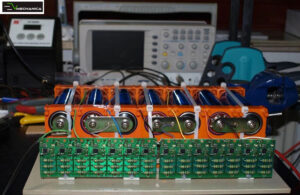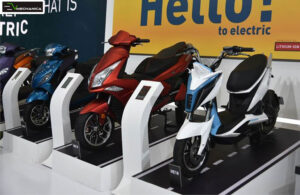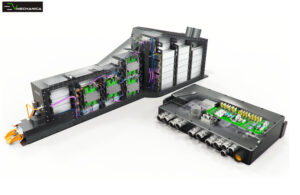 The unprecedented growth of the Electric Two-Wheelers market in India has given rise to a new class of OEMs that are focused on developing the Right BMS for Electric Two-Wheelers that will suit their needs.
The unprecedented growth of the Electric Two-Wheelers market in India has given rise to a new class of OEMs that are focused on developing the Right BMS for Electric Two-Wheelers that will suit their needs.
A BMS is mainly responsible for managing the battery pack’s charging, discharging, and overall health. It is essential to identify the right BMS to ensure the longevity and performance of your electric two-wheeler’s battery.
In order to prevent battery failure and mitigate potential hazardous situations, a supervising system is vital for the vehicle that will ensure that batteries function properly in the final application. This supervising system is typically named a Battery Management System (BMS).
The significance of choosing the Right BMS for Electric Two-Wheelers can be calculated by the recent collaboration of Exicom, who has signed an agreement to supply battery management systems (BMS) for Hero Electric’s two-wheelers.
How to Choose the Right BMS for Electric Two-Wheelers?
Pointing out some of the key factors to consider when identifying the Right BMS for Electric Two-Wheeler,
Battery Type
 In the first step of choosing the Right BMS for Electric Two-Wheelers, one should check the compatibility of the type of battery used in the electric two-wheeler. There are different types of batteries available, such as lead-acid, nickel-cadmium, lithium-ion, and others. Each type of battery has different charging and discharging requirements, and the BMS should be designed to meet those requirements.
In the first step of choosing the Right BMS for Electric Two-Wheelers, one should check the compatibility of the type of battery used in the electric two-wheeler. There are different types of batteries available, such as lead-acid, nickel-cadmium, lithium-ion, and others. Each type of battery has different charging and discharging requirements, and the BMS should be designed to meet those requirements.
Battery Capacity
In an effort to pick the Right BMS for Electric Two-Wheelers, one should choose the type of batteries having high capacity. The battery’s capacity is measured in ampere-hours (Ah), and the BMS should be able to handle the charging and discharging of the battery without any issues. It is crucial to choose a BMS that is compatible with the battery’s capacity to ensure optimal performance and longevity.
Voltage
The Right BMS for Electric Two-Wheelers should be designed to match the voltage of the battery. The voltage of the battery determines the power output of the electric two-wheeler. The BMS should be designed to handle the voltage of the battery and prevent overcharging or discharging, which can damage the battery and the electric two-wheeler.
Safety Features
Another key factor in determining the Right BMS for Electric Two-Wheelers is the safety features available that can prevent overcharging, overheating, over-discharging, and short circuits. The BMS should also be designed to handle different environmental conditions, such as temperature changes, to ensure the safety and longevity of the battery and the electric two-wheeler.
User Interface
While selecting a BMS for Electric Two-Wheelers, one should choose a user-friendly interface that allows the rider to monitor the battery’s status, such as the charge level, temperature, and voltage. The interface should also provide information on the electric two-wheeler’s performance, such as the range and speed, to help the rider make informed decisions about charging and riding.
Durability
 The BMS should be durable and able to withstand the vibration and shock that can occur during riding. The BMS should also be designed to handle the wear and tear of regular use, as well as the harsh environmental conditions that can occur during riding.
The BMS should be durable and able to withstand the vibration and shock that can occur during riding. The BMS should also be designed to handle the wear and tear of regular use, as well as the harsh environmental conditions that can occur during riding.
Price
The price of the BMS for Electric Two-Wheelers should also be reasonable and within the driver’s budget. It is essential to balance the cost of the BMS with its features and performance to ensure that you get the best value for your money.
Customizability
Some electric two-wheeler manufacturers may require a customized BMS for Electric Two-Wheelers that is specifically designed to meet their unique requirements. In such cases, it may be necessary to work with a BMS manufacturer that offers customization services. For example, TCED Batteries is a BMS manufacturer that offers customized BMS solutions for various electric vehicles.
Communication Protocol
The BMS should be compatible with the communication protocol used by the electric two-wheeler’s motor controller. The communication protocol allows the BMS to communicate with the motor controller to manage the battery’s charging and discharging. For example, Lithium Balance is a BMS manufacturer that offers products with different communication protocols, such as CAN bus, UART, and SMBus.
Warranty and Support
It is essential to select a BMS manufacturer that offers a warranty and provides technical support if needed. This ensures that one has access to assistance if any issues arise with the Right BMS for Electric Two-Wheelers. For example, Ewert Energy Systems offers a 2-year warranty on its BMS products and provides technical support to customers.
Energy Efficiency
The BMS should be designed to maximize the battery’s energy efficiency, which can increase the electric two-wheeler’s range and performance. For example, Nuvation Energy offers BMS products that use advanced algorithms to optimize the battery’s energy efficiency.
Compatibility with Battery Management Software
The BMS should be compatible with battery management software that allows the rider to monitor the battery’s performance and health. For example, Orion BMS is a BMS manufacturer that offers a software suite that allows the rider to monitor the battery’s status, configure settings, and perform diagnostics.
Wrapping Up
 Remember, selecting the Right BMS for Electric Two-Wheelers is an important decision that requires careful consideration of various factors.
Remember, selecting the Right BMS for Electric Two-Wheelers is an important decision that requires careful consideration of various factors.
It is essential to consider the battery type, capacity, voltage, safety features, user interface, durability, and price when selecting a BMS.
By taking these factors into account, one can ensure to choose the Right BMS for Electric Two-Wheelers and enjoy a safe and efficient riding experience.
